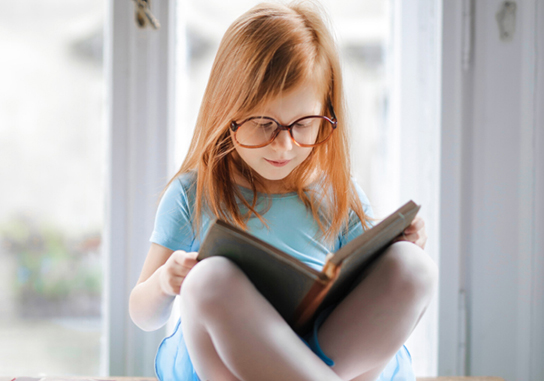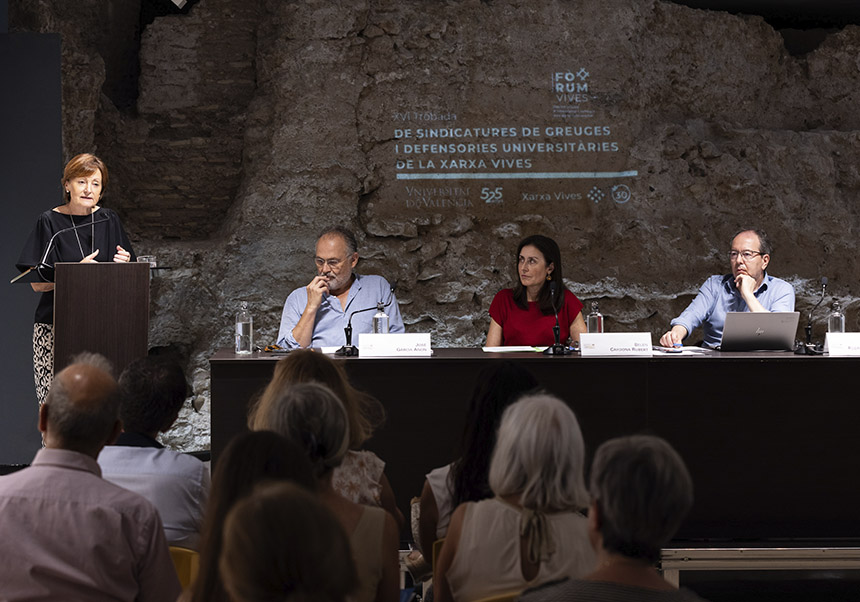A different World Book Day

The Office of the Vice-Principal for Equality, Diversity and Sustainability of the Universitat de València celebrated the World Book Day in confinement via the Instagram account of the Diversitats initiative.
The employees of the Office of the Vice-Principal and the professors of the Universitat de València made a few recommendations on the literature for children and adults on the subjects of Equality, Diversity, and Sustainability in direct streaming on Instagram.
The vice-principal Elena Martínez opened the activity explaining the work realised in various areas. “A book is a window that allows us to converse with ourselves and gives us the opportunity to dream and imagine. This is a perfect moment for the children to see us read and share this experience with them.” The vice-principal recommended the 1984 book of George Orwel that she had just finished reading and pointed out its relevance today regarding the deprivation of freedom and our feelings. At last, she expressed her gratitude to the viewers for their recommendations and complimentedDiversitats for their idea. Other speakers were presenting the books and editorial projects online within the line of work of the Office of the Vice-Principal for Equality, Diversity and Sustainability.
Pilar Rueda, a delegate of the Principal for Sustainability issues, has presented children books, comics, and magazines discussing the topics of sustainability and savin the planet. She first introduced the book on biodiversity Actual Size of Steve Jenkins, which shows the actual size of some animals. How can a giant squid fit inside a book? Well, by showing only an eye which takes up the whole page... Regarding the comics, Pilar Rueda suggested three books from the SúperLópez collection: “Vamos a Ver Elefantes”, “Los Ladrones de Ozono”, and “El Virus Frankenstein”, providing some interesting environmental considerations. The last recommendation for all audiences was the National Geographic magazine which includes all kinds of material from the collections of environmental photography to documentary reports on environmental, social, and technological topics.
With the help of the university professors of literature, Diversitats suggessted the books that show the children the wealth and importance of human diversity. Patricia Picazo, a professor of Theory of Literature and Comparative Literature and an expert in postcolonial studies and African culture, offered a series of readings that “allow us to learn more about the cultural diversity here and there. It is especially important in a moment like this which shows us that ‘here’ and ‘there’ do not exist anymore; a moment to understand that there is no ‘us’ and ‘them’, and we all form a part of the diversity.”
She recommends a story El Viaje de Ilombe of the editorial project PotoPoto. It is a tool to construct the historic memory of the childhood of the African in diaspora and presents the readers with the characters other than blue-eyed blond princesses. In addition, Ada Twist, Scientist by Andrea Beaty and Mujeres Negras en la Ciencia by Zinthia Palomino and Muñeca Sefcik are on the recommended readings list. These books are claimed to break the stereotypes and show women in STEM-related fields. These are the females who have overcome the obstacles and have become the pioneers in their fields of work even though the majority of people still knows nothing about their contributions. Professor Picazo pointed out that these two books are essential for teachers who should revise their course materials and include these forgotten references.
Patricia Picazo specified that, in this moment of confinement, it is important to support the initiatives of small libraries and editorials like United Minds, where such literary jewels can be found. Located in Valencia, this is the first and only library of Spain dedicated to the African culture, its contributions, and figures of the African origins in our country.
Miquel Oltra, professor of the Department of Language and Literature Teaching and director of the research group Education and Diversity LGTBIQ+ (EDiUV), has recommended readings to work on sexual affective life and gender diversity with children and young people: the album Titiritesa by Xerardo Quintiá, with marvellous illustrations of lesbian themes in good literary quality; El Viaje de Flop, a project of the Lambda association that talks about diversity in general with very interesting teaching proposals and materials to work on reading and writing... He has also recommended other books such as The Art of Being Normal by Lisa Williamson; Calvina by Carlo Frabetti or La Edad de la Ira by Nando López, the winner of the Prize SM Grande Angular 2020. Among other editorial projects, he has highlighted the publishing house Bellaterra, specialised in children's literature on diversity specifying on trans themes.
Finally, the colleagues in the Equality Unit have given a set of recommendations. Pau Serrano, a technician at the Unit of Equality, has highlighted a number of books and stories that have proliferated in recent years which aim to make women visible in various fields, presenting stories with feminine proper names, creating references in all areas, especially in those more male-dominated.
In this line, we find the title Un Conte Propi. Històries per a Escort i Llegir, Heroïnes per a Descobrir by Takatuka publishing house. The book gathers stories about the life of Harriet Tubman, who helped to end slavery in the United States of America; Concepción Arenal's struggle in Spain to help women to be allowed to go to university; the incredible experience of Gaura Devi and the Chipko movement to stop the indiscriminate deforestation in India; the story of Alia Muhammad Baqer who, during the invasion of Iraq, managed to save the library of Basra from bombardments; and the power of art in the service of women's rights with Mujeres Creando from Bolivia. This story also contains a CD with which you can listen to each of the stories and songs that correspond to each of the protagonists, which is essential to bring these stories closer to people with a visual diversity/handicap.
The fact that the commemoration of the World Book Day of this year is in confinement has prevented some new publications from being presented, explained Pau Serrano. In fact, Contem Històries de Dones d'Ací, by the sisters Rosa and Manola Roig and published by Vincle, has already a second volume with 22 more protagonists, but on the Instagram Live only the first of the two volumes has been discussed. The book brings us closer to 21 Valencian women among whom we find the former minister and professor of the UVEG Carmen Alborch; the writer Isabel-Clara Simó; the UVEG philosopher Adela Cortina; among others.
In the end, he wanted to highlight one of the first books that helped in the nineties to start the work of awareness-raising and education in values: Politically Correct Bedtime Stories. The book provides a critical view and adaptation of the classics of children's literature from a feminist, anti-militarist and anti-racist perspective.
Inés Soler, doctor in Sociology, technician at the Unit of Equality and responsible for the Observatory of Equality, has stressed that her recommendations were addressed to the child audience. Because the fact that families are confined to the home with children can facilitate a very important element: that we spend more hours and do more reading sessions with them. Thus, Inés Soler started her recommendations with Rosa Caramelo, a classic by Adela Turin and Nellia Bosnia published by Kalandraka, and that in spite of the years it has been published, it is in full validity. A book to work on concepts such as self-esteem, freedom, equality and gender.
Good Night Stories for Rebel Girls, which has already become a reference and has been translated into more than 40 languages, was the second recommendation of Inés Soler. The book has already become an icon of women's empowerment movement, telling the story of the lives of extraordinary women by encouraging girls to fulfil their dreams.
Inés Soler has concluded her contribution with the collection 'Contes desexplicats', which includes Caputxeta Forçuda or La Rateta que Llegia a l'Escaleta. A collection that goes over the children's classics and changes them with a completely feminist touch.
The Libraries Service of the Universitat has also joined the celebration of this event with the campaign 'Mi libro es mi ventana' (My book is my window) with photographs of people reading next to the window, in the terrace or balcony of their house, which has been a success.
















